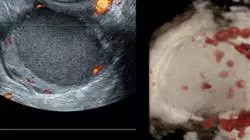University certificate
The world's largest faculty of medicine”
Introduction to the Program
With this program we want to help you achieve your goal of acquiring superior knowledge in this highly-demanded field"

This program brings together all the specialties involved in the assessment and diagnosis of endometriosis and is prepared by professionals with the highest level of excellence. A unique multidisciplinary program that helps students acquire the highest degree of specialization in dealing with the disease.
This high-level Postgraduate diploma will use practical teaching to present the protocols used day to day in endometriosis units.
Students will have the opportunity to learn how to use and interpret both new technologies and the most current genetic tests in the early diagnosis of Endometriosis.
This Postgraduate diploma is designed to help professionals to better treat their patients affected by endometriosis. Experienced teachers will help students learn about the evaluation mechanisms and endometriosis diagnoses through a practical and theoretical learning experience.
Through the knowledge and understanding gained, the student will be capable of working independently in the comprehensive assessment of Endometriosis, as well as being able to make decisions about its evolutionary course, and will subsequently be able to become a certified Endometriosis specialist.
For all these reasons, TECH has designed this Postgraduate diploma, which will provide professionals with specialized knowledge to develop a comprehensive approach to their patients from a multidisciplinary point of view, all thanks to the content developed by doctors from different specialties. It is an intensive program, designed to learn about the technologies, materials and treatments of this discipline and includes a complete perspective of the techniques used in Endometriosis, allowing you to specialize in an effective and responsible way. In this way, this postgraduate course provides high level training that seeks excellence.
In addition, its 100% online format will allow you to study from wherever you want, without the need to travel or adhere to fixed class timetables.
A Postgraduate diploma created to take the professional through the essential knowledge in Endometriosis, which they will be able to apply in their daily practice"
The Postgraduate diploma in Clinical Evaluation and Diagnosis of Endometriosis contains the most complete and up-to-date scientific program on the market. The most important features include:
- The development of case studies presented by experts in Endometriosis
- The graphic, schematic, and eminently practical contents with which they are created provide scientific and practical information on the disciplines that are essential for professional practice
- New developments in Endometriosis Techniques
- Practical exercises where the self-assessment process can be carried out to improve learning
- Special emphasis on innovative methodologies in Endometriosis techniques
- Theoretical lessons, questions to the expert, debate forums on controversial topics, and individual reflection assignments
- Content that is accessible from any fixed or portable device with an Internet connection
Expand your knowledge through this Postgraduate diploma and specialize in Endometriosis to achieve excellence in this field"
The teaching staff includes medical professionals who contribute their experience to this program, as well as renowned specialists from leading societies and prestigious universities.
The multimedia content, developed with the latest educational technology, will provide the professional with situated and contextual learning, i.e., a simulated environment that will provide immersive training programmed to learn in real situations.
This program is designed around Problem-Based Learning, whereby the physician must try to solve the different professional practice situations that arise during the academic year. For this purpose, the professional will be assisted by an innovative interactive video system created by renowned and experienced experts in Endometriosis.
Increase your decision-making confidence by updating your knowledge with this Postgraduate diploma course"

You will be trained by professionals who have extensive experience in the sector, and who have contributed all their knowledge and experience to the development of this program"
Why study at TECH?
TECH is the world’s largest online university. With an impressive catalog of more than 14,000 university programs available in 11 languages, it is positioned as a leader in employability, with a 99% job placement rate. In addition, it relies on an enormous faculty of more than 6,000 professors of the highest international renown.

Study at the world's largest online university and guarantee your professional success. The future starts at TECH”
The world’s best online university according to FORBES
The prestigious Forbes magazine, specialized in business and finance, has highlighted TECH as “the world's best online university” This is what they have recently stated in an article in their digital edition in which they echo the success story of this institution, “thanks to the academic offer it provides, the selection of its teaching staff, and an innovative learning method aimed at educating the professionals of the future”
A revolutionary study method, a cutting-edge faculty and a practical focus: the key to TECH's success.
The most complete study plans on the university scene
TECH offers the most complete study plans on the university scene, with syllabuses that cover fundamental concepts and, at the same time, the main scientific advances in their specific scientific areas. In addition, these programs are continuously being updated to guarantee students the academic vanguard and the most in-demand professional skills. In this way, the university's qualifications provide its graduates with a significant advantage to propel their careers to success.
TECH offers the most comprehensive and intensive study plans on the current university scene.
A world-class teaching staff
TECH's teaching staff is made up of more than 6,000 professors with the highest international recognition. Professors, researchers and top executives of multinational companies, including Isaiah Covington, performance coach of the Boston Celtics; Magda Romanska, principal investigator at Harvard MetaLAB; Ignacio Wistumba, chairman of the department of translational molecular pathology at MD Anderson Cancer Center; and D.W. Pine, creative director of TIME magazine, among others.
Internationally renowned experts, specialized in different branches of Health, Technology, Communication and Business, form part of the TECH faculty.
A unique learning method
TECH is the first university to use Relearning in all its programs. It is the best online learning methodology, accredited with international teaching quality certifications, provided by prestigious educational agencies. In addition, this disruptive educational model is complemented with the “Case Method”, thereby setting up a unique online teaching strategy. Innovative teaching resources are also implemented, including detailed videos, infographics and interactive summaries.
TECH combines Relearning and the Case Method in all its university programs to guarantee excellent theoretical and practical learning, studying whenever and wherever you want.
The world's largest online university
TECH is the world’s largest online university. We are the largest educational institution, with the best and widest online educational catalog, one hundred percent online and covering the vast majority of areas of knowledge. We offer a large selection of our own degrees and accredited online undergraduate and postgraduate degrees. In total, more than 14,000 university degrees, in eleven different languages, make us the largest educational largest in the world.
TECH has the world's most extensive catalog of academic and official programs, available in more than 11 languages.
Google Premier Partner
The American technology giant has awarded TECH the Google Google Premier Partner badge. This award, which is only available to 3% of the world's companies, highlights the efficient, flexible and tailored experience that this university provides to students. The recognition as a Google Premier Partner not only accredits the maximum rigor, performance and investment in TECH's digital infrastructures, but also places this university as one of the world's leading technology companies.
Google has positioned TECH in the top 3% of the world's most important technology companies by awarding it its Google Premier Partner badge.
The official online university of the NBA
TECH is the official online university of the NBA. Thanks to our agreement with the biggest league in basketball, we offer our students exclusive university programs, as well as a wide variety of educational resources focused on the business of the league and other areas of the sports industry. Each program is made up of a uniquely designed syllabus and features exceptional guest hosts: professionals with a distinguished sports background who will offer their expertise on the most relevant topics.
TECH has been selected by the NBA, the world's top basketball league, as its official online university.
The top-rated university by its students
Students have positioned TECH as the world's top-rated university on the main review websites, with a highest rating of 4.9 out of 5, obtained from more than 1,000 reviews. These results consolidate TECH as the benchmark university institution at an international level, reflecting the excellence and positive impact of its educational model.” reflecting the excellence and positive impact of its educational model.”
TECH is the world’s top-rated university by its students.
Leaders in employability
TECH has managed to become the leading university in employability. 99% of its students obtain jobs in the academic field they have studied, within one year of completing any of the university's programs. A similar number achieve immediate career enhancement. All this thanks to a study methodology that bases its effectiveness on the acquisition of practical skills, which are absolutely necessary for professional development.
99% of TECH graduates find a job within a year of completing their studies.
Postgraduate Diploma in Clinical Evaluation and Diagnosis of Endometriosis.
Clinical evaluation of endometriosis is a medical process that involves reviewing and studying a woman's symptoms and signs to determine if she may be experiencing endometriosis. Endometriosis is a condition in which tissue that normally lines the inside of the uterus begins to grow in other parts of the body, such as the ovaries, fallopian tubes, colon and other places.
During a clinical evaluation, the physician may perform a pelvic examination to detect abnormal masses in the reproductive organs and check for pain in certain areas. He or she may also order blood and urine tests to look for signs of inflammation and other abnormalities. Diagnostic tests, such as transvaginal ultrasound, MRI and laparoscopy, can also help confirm or rule out the presence of endometriosis.
Clinical evaluation of endometriosis is important to diagnose and treat the disease early, as it can cause pain, infertility and other problems. Early diagnosis can help women manage symptoms and receive effective treatment, which can improve their long-term quality of life.
TECH the world's largest digital university has a specialized academic program designed to provide students with solid skills in the clinical evaluation of endometriosis and expertise in its management. Students will learn to apply current diagnostic and treatment techniques and work in multidisciplinary teams to provide a comprehensive approach to patient care. This program is intended for medical and Nursing professionals who wish to develop advanced skills in the evaluation and management of endometriosis, including gynecologists, gynecological nurses, and other allied health professionals.







